Have Your Say: What advice would you give to the next generation of interior designers?
At Design Insider we recognise the expertise within commercial interiors and we are proud to instigate conversations which inform, challenge & inspire the people who make our sector thrive.
We’ve brought together industry experts to share their advice for the next generation of interior designers?
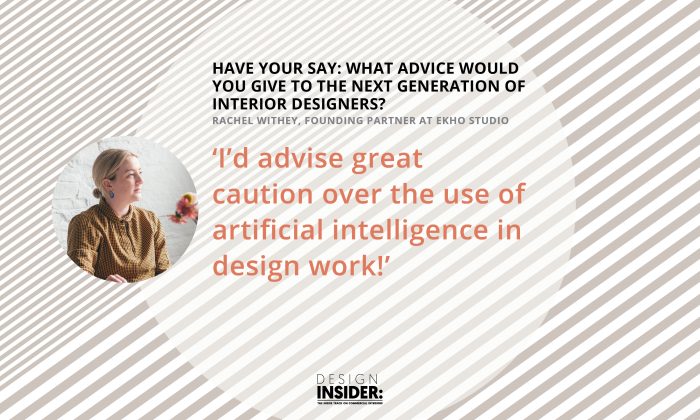
I’d advise great caution over the use of artificial intelligence in design work. AI is pattern-based and always a re-hash of what it already knows – and therefore of what’s already been done. I’m not against it in any way, but it’s a tool that requires very specific applications and is absolutely not a replacement in the early stages of a project for either thinking or sketching things out, however tempting the shortcut seems to be.
Good design responses require a gut reaction – a first response that sometimes lies beyond rationality, until you can work out what that response was based on. You will also need to justify every decision you make further down the line as projects develop – and how can you do that if AI has done the thinking for you? In short, never forget that the real innovation and imagination needs to come from YOU!
Rachel Withey, Founding Partner at Ekho Studio
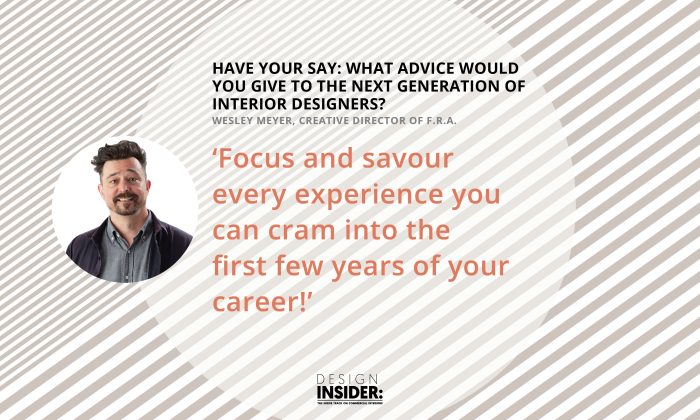
You will never have more energy, be less distracted and have less responsibility than you do right now. Focus and savour every experience you can cram into the first few years of your career. Take every assignment and do the best work you can. If it’s not good enough, at least be the first one ‘in’ in the morning. The real reason you’re doing this is to meet as many people as possible. Gather as many colleagues, collaborators, mentors, etc as you can. The right ones will stick with you, and you’ll find your tribe. Be as technically brilliant as you can, but it’s relationships that will get you what you want.
Wesley Meyer, Creative Director of f.r.a.
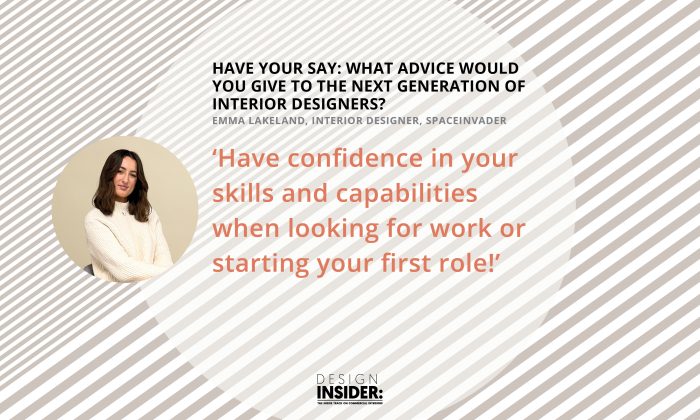
As a recent graduate myself, I’d advise upcoming new graduates and those still studying to trust the process and have confidence in your skills and capabilities when looking for work or starting your first role. The main thing to remember is that you already have all the skills. It’s about building on those and being open minded to further learning from more experienced team members.
When you’re approaching the end of your final year and starting the job hunt, make sure your portfolio stands out. What helped me get interviews and interest was having my own unique visual style and keeping my portfolio concise.
Lastly, be open minded and stay inspired. It’s very easy to feel demotivated when finishing university and going through the job application process, so remember what you’re aiming for and keep on top of your skills by doing little projects for yourself, friends and family. You may not get the first job you interview for – or even the second or third – but it’s not a sign of failure. See it as a redirection to landing exactly the right job for you!
Emma Lakeland, Interior Designer, SpaceInvader
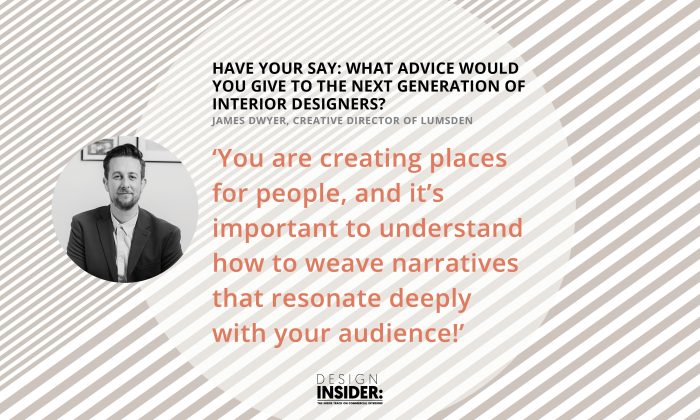
My advice to the next generation of interior designers is to see yourselves as storytellers. You are creating places for people, and it’s important to understand how to weave narratives that resonate deeply with your audience. It’s a bit like making a film, imagine you are taking your audience on a multi-sensory journey, where every moment, sightline, touchpoint and interaction becomes part of the story that you, the director, are creating. And as editor, ensure your vision remains clear, unified and cohesive. And the only way you can craft compelling stories is to stay curious and continuously seek to immerse yourself in diverse experiences. So, embrace new technology and tools, but always remember it’s the sparks of inspiration that come from real-life experiences, such as travel, arts, culture and the natural world that will enable you to create unique environments for people to enjoy.
James Dwyer, Creative Director of Lumsden
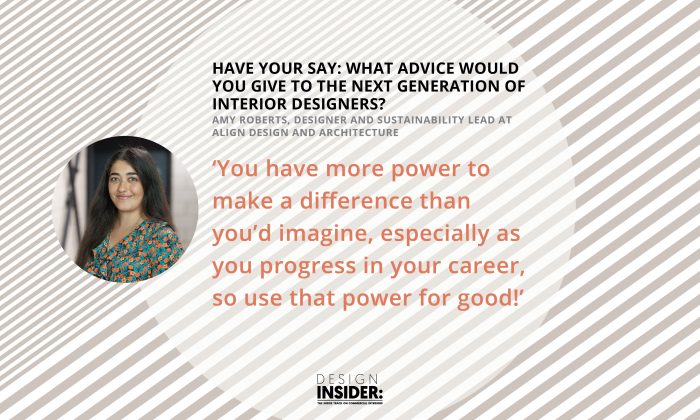
Be the change you want to see in the world. You have more power to make a difference than you’d imagine, especially as you progress in your career, so use that power for good! As designers in the built environment, decisions we make have a direct impact on people and the planet, so it’s crucial that’s remembered at every stage of the design process.
The construction industry is responsible for about 40% of CO2 emissions globally. We need to do better, and as the next generation you have the responsibility to do what you can for the future. Ask yourself questions and critique your work, so that your designs are as sustainable as they can be. Think globally, keep learning, and most importantly stay passionate.
Amy Roberts, Designer and Sustainability Lead at Align Design and Architecture
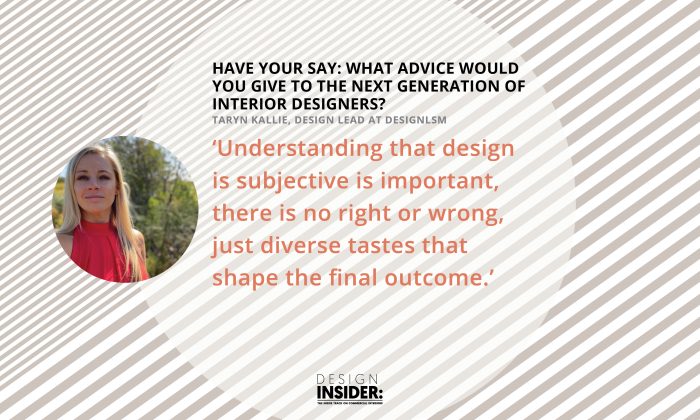
Remember that good interior design transcends mere aesthetics – it should intentionally fulfil the needs and desires of those using the space, both from a guest perspective and operational functionality. Understanding that design is subjective is important, there is no right or wrong, just diverse tastes that shape the final outcome – be open to other opinions and remain open to constructive criticism, seeing it as an opportunity for growth rather than a personal attack. Great designs can come from a collaborative process, and so it’s integral to receive input from all parties – including the client, co-consultants, colleagues, and fellow creatives. Whilst a degree forms a good foundation for a career in design, a large proportion of learning will be gained on the job, so don’t feel like you should know everything straight away – never hesitate to seek advice and always strive to expand your knowledge, exploring various sectors to uncover your passions and strengths, knowing that it takes time to find your niche in the dynamic field of interior design.
Taryn Kallie, Design Lead at DesignLSM
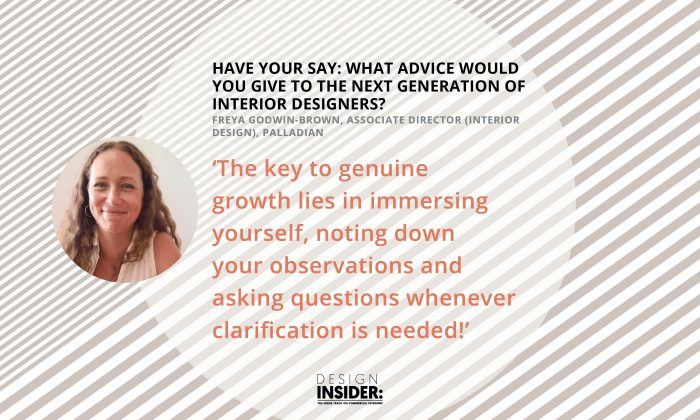
Always be open to learning. The key to genuine growth lies in immersing yourself, noting down your observations and asking questions whenever clarification is needed. There are learnings at many stages in a project, be it utilising the expertise of experienced trades to absorbing sparks of inspiration or embodying professionalism in client meetings. Make sure to document your journey by taking notes and photographs, allowing you to carry valuable insights with you as you progress in our wonderful world of interior design.
Something else that’s important is to split your focus between the grand vision and the small details throughout the design process. Balancing the concept and the intricacies of final execution is paramount in interior design. While the grand vision sets the stage, the small details add depth and character while breathing life into the space, crafting spaces that will captivate at both a macro and micro level.
Freya Godwin-Brown, Associate Director (Interior Design), Palladian




